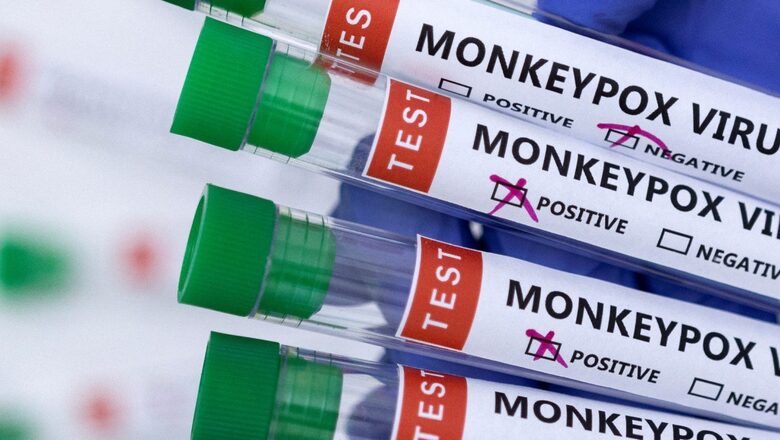
views
Several national health authorities across the world have confirmed cases of monkeypox, a rare viral infection. In a recent session, the World Health Organization said it expects a surge monkeypox cases across the world in the near future. Over the past five decades, cases of monkeypox in most countries outside Africa were linked to travel to the continent. However, more than 2,100 cases have now been found in over 42 countries, and the majority of these cannot be linked back to Africa.
Over the years, smallpox vaccines have been tested and shown to be effective against monkeypox. Having said that, this does not mean that it is not a cause of concern as the usage of smallpox vaccines were stopped decades ago and are now mostly stockpiled for national security reasons in very few countries. Even though India has not reported any case so far, the country is observing more cases of Covid-19 each day. Therefore, it is important to take necessary measures to avoid the double burden.
The Current Scenario
From 1970 until this January, human cases of monkeypox were reported from 11 African countries. Until very recently, monkeypox cases in countries outside Africa such as Israel, USA, UK and Singapore occurred due to international travel or imported animals. More recently, countries such as the UAE, Czech Republic, Sweden and several others reported their first ever case.
As of June 18, around 2,103 monkeypox cases have been reported from 42 countries since January. WHO has called out this quick spread of the virus as “unusual”. Many countries in the past two months have unexpectedly seen an appearance of monkeypox cases even in the absence of direct links to endemic countries. There is a chance that transmission may have occurred for a while without being noticed. WHO eliminated the distinction between endemic and non-endemic countries in order to coordinate efforts to combat the virus.
Monkeypox Threat. Should India be Scared?
After the devastation caused by the Covid-19 pandemic, authorities around the world are on a constant lookout for possible deadly infections. There could be a few possible explanations for the sudden outbreak of cases in several regions. Smallpox vaccine inoculation was stopped after its successful eradication and the immunity from the vaccine waned. It is also possible that the virus has mutated and is now more transmissible than before, however, we are yet to get complete evidence on that.
According to latest reports, the virus is now spreading from person to person even in non-endemic countries. Like Covid-19, monkeypox can be transmitted through respiratory droplets although current evidence suggests transmission is only through sustained close contact. Apart from this, while infection with monkeypox during pregnancy is not fully understood, limited data suggests that the infection may lead to adverse outcomes for the foetus or newborn.
The good part is that many of the same precautions that lower the chance of contracting Covid, such as avoiding close contact with others, using masks in public, washing one’s hands frequently, and disinfecting surfaces, also lower the risk of contracting monkeypox.
For the past two years, people have become adaptive to such measures in emergency situations and hence this time, if necessary, it would be easier to mobilise people in doing so. In comparison to Covid-19 where it took several months to develop and test a new vaccine, with monkeypox it won’t be that long as we already have the vaccine and certain promising candidates for mass production. The challenge, however, will be for producing vaccines in a short time and distributing it equitably.
Possible Steps to Control the Spread
It is quite imperative to understand that any infection, especially a virus using the respiratory route has the potential to infect a large population. A measure called ‘ring vaccination’ is effective against monkeypox. In this, vaccination is given to all close contacts of a suspected or a confirmed case. This will help contain the virus before it spreads uncontrollably. Making information widely available about the virus to healthcare workers and the general public is equally important. Information and education campaigns play a significant role in stopping the spread of infectious diseases.
Taking advantage of our large vaccine manufacturing base, India should restart manufacturing of the smallpox vaccine until the time we are able to get vaccines for monkeypox. We should also prepare ourselves for using these doses for ring vaccination. Early in the clinical stages of the disease, smallpox vaccination can be used for treatment. We should also improve our testing capacity to diagnose the disease and detect cases before they spread.
This is not the last time there is an emergence of a potentially destructive virus. We can hope that we are able to curtail the spread of monkeypox, but increased globalisation, climate change and more human-animal interaction will only lead to more such situations.
We have to increase our human capital and resource investment in the disease surveillance capacity and be able to get tests and therapies for future threats.
Dr Harshit Kukreja is Research Analyst, and Mahek Nankani is Assistant Programme Manager at Takshashila Institution. The views expressed in this article are those of the authors and do not represent the stand of this publication.
Read all the Latest News , Breaking News , watch Top Videos and Live TV here.




















Comments
0 comment